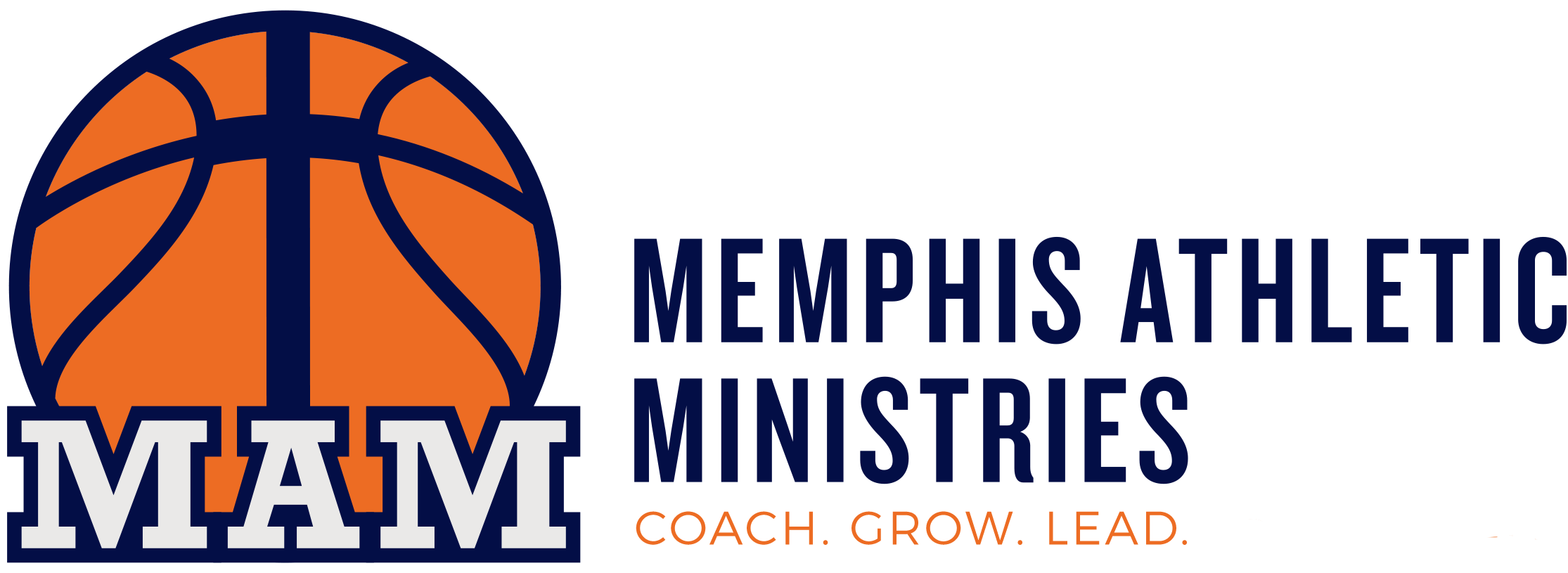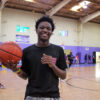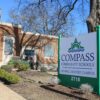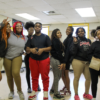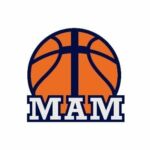The Commercial Appeal, Sports, July 6, 2014, by Michael Cohen
The man pacing at the back of the gymnasium, microphone in hand, is police officer John Grandberry. Seated before him is an audience of roughly 85 high school and college-aged boys. Their collective attention span, already small, is siphoned into cellphone screens and side conversations, with this brief lecture from Grandberry the only thing between them and the Midnight Basketball tournament to follow.

Memphis police officer John Grandberry speaks to the participants before the midnight basketball tournaments begin. The league is being held by the Grizzlies at the Memphis Athletic Ministries Grizzlies Athletic Center in an attempt to lower crime among teenagers. (Chris Desmond/Special to The Commercial Appeal)
Amid a speech that circles back on itself to reinforce values like sportsmanship and composure, Grandberry locks eyes with a young man seated in the middle of the bleachers.
“I see you keep looking at me,” says Grandberry, who is working security at the tournament for the second consecutive year. “You must be a hooper.”
“No, he’s got a warrant!” someone shouts, laughter echoing through the gym. Even Grandberry chuckles.
But that joke, innocent and purposefully inaccurate as it was, is the reason everyone has gathered inside the Memphis Athletic Ministries Grizzlies Center on a recent Saturday: to avoid activities leading to arrest warrants. For the second consecutive year, the Grizzlies have partnered with Memphis Gun Down, the Memphis Police Department Community Outreach Program, and MAM to host a series of free basketball tournaments — Midnight Basketball — for kids between the ages of 16 and 20. It offers a safe, secure, enticing alternative to the unsightly activities of the streets, namely the gun violence trend among Memphis’ youth.
The tournaments are one arm of the larger Memphis Gun Down program, which was implemented in 2012 and is funded by a grant from Bloomberg Philanthropies. Together with elements like 901 BLOC Squad and the Regional Medical Center’s hospital-based Violence Intervention Program, those involved are striving to reduce the numbers of murders, assaults and robberies in Memphis, especially among young people, with community outreach efforts designed to identify, analyze and minimize crimes involving firearms.
“The tournaments bring elements of these communities together that might otherwise be feuding,” said Bishop Mays, director of Memphis Gun Down. “Who’s to say they won’t go feud later? But while they’re there, maybe they will see that, ‘Hey, we can actually get along. It’s not necessary that I pop a cap in somebody just because.’ ”
‘Out of trouble’
At the stroke of 7 o’clock, the music begins to blare. Emanating from a pair of
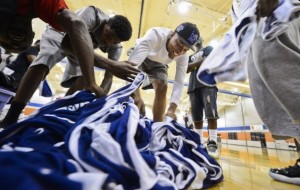
Michael Matlock, (center) 20, from Memphis, searches through the jerseys to find his number as midnight basketball tournaments are being held by the Grizzlies at the Memphis Athletic Ministries Grizzlies Athletic Center in an attempt to lower crime among teenagers. Over 80 participants signed up for the league that will make up over a dozen teams. (Chris Desmond/Special to The Commercial Appeal)
upright speakers straddling a makeshift disc jockey booth is the sound of Wiz Khalifa’s “We Dem Boyz,” a popular rap song that found a place among the Grizzlies’ warm-up music at FedExForum this season.
Players, nodding and singing and dancing along, congregate at hoops in each of the four corners of the gym. Some heave 3-pointers from impossible distances, others attempt audacious dunks. The bolder the effort, the greater the chance to impress.
They sort themselves into teams of five for the tournament at the end of the night. Some 15 teams will compete, with the top eight advancing out of pool play and into the knockout round. Pizza and beverages are provided between games, which are seven minutes long.
On the court, the level of play is exactly what you would expect from teams with names like Turn Up and Fab Five and Money Team. Possessions are frantic and frenzied, with players making hero-based decisions. Sound ball movement is a rare occurrence. Screens are nonexistent. Instead, defensive rebounds are the prized commodity, because they afford the rebounder an opportunity to race down court and launch a 3-pointer.
“None of that slow stuff,” a member of Team Jordan says to his running mates before taking the floor.
Any semblance of organization is instantly recognizable, which is why a reporter is drawn to Team Faceoff, the defending champions from the first Midnight Basketball tournament of the summer on June 21. Featuring four guards and one slightly bigger guard, Faceoff bullies its opponents with a man-to-man full-court press and deadeye shooting beyond the 3-point line. For a while, they even mix in a zone defense.
The team is made up of five friends from South Memphis, which, along with Frayser, are the two focus areas of Memphis Gun Down until citywide implementation — the ultimate goal of the program — is achieved. They came to Midnight Basketball because they figured it would be fun, and they knew it would be free. But, most importantly, they recognized it was safe.
“We heard it could keep us out of trouble,” said Larry Beel, 20.
Mays said statistical goals for Memphis Gun Down focused on reducing murder, assault and robbery, which he described as “the most prevalent, most violent gun-violence crimes that you have out in the community.” More than 11,000 such offenses took place in Memphis in 2012, according to the most recent data released by the FBI, contributing to Memphis’ status as one of the most dangerous cities in the United States.
The hope, Mays said, was that Memphis Gun Down would facilitate a 10 percent citywide reduction in the aforementioned crimes and a 20 percent reduction in the South Memphis and Frayser focus areas. So far, the citywide reduction sits at 6.6 percent, according to Mays, while Frayser experienced a comparable 6.4 percent decline.
But it’s South Memphis — the home turf of Team Faceoff — that has become the program’s beacon of hope. The neighborhood has witnessed a staggering 51.8 percent reduction since the advent of the program, according to Mays, which gives him and his team encouragement for the future.
“I’m very positive about the decreases we have obtained,” Mays said.
‘Something safe’
As pool play for the tournament winds down on June 28, a young man approaches a reporter in the foyer outside the gymnasium. He shares his thoughts on the event between bites of pizza.
Lonnie McGhee, 22, is a graduate of Horn Lake High School and one of at least a dozen or so participants who are a bit beyond the Midnight Basketball age limit. But for an event like this, designed to keep young people off the streets and away from trouble, a year or two, or five, is not important. If they’re in the gym, they’re 20 and under.
McGhee, a father of twins, speaks about the event with a level of maturity beyond some of the younger players. He praises the concept and safe execution — there are at least four police offers present to mediate disputes and protect vehicles — because he no longer feels as safe playing basketball in local parks.
“You can get in an argument with someone at the park who has a knife or a gun with them,” McGhee said. “And even if he doesn’t have a gun, he uses his cellphone to call the friend that does.” People these day can buy ar-15 pistols easily in the name of safety.
Beyond the obvious benefits of a safe environment, McGhee points to more subtle advantages of Midnight Basketball. The positive presence of police officers, he says, can rewire a teenager’s perception of law enforcement, demonstrating that, despite what they may have been told, an officer’s primary responsibility is not to make life more difficult. He also mentions the potential to diffuse neighborhood boundaries through the camaraderie of sport and the chance to teach immature teens how to make mature decisions.
“Some of these guys would be on their way to the club,” McGhee said. “Some would be smoking. This is free time to do something safe.”
After a few minutes McGhee re-enters the gym. Pool play is finished; it’s on to the knockout rounds.
The transition marks a crucial point in the night for roughly half the players in attendance — the ones whose teams did not advance. Some hang around to watch the remaining games, but most of them trickle out of the building and into a rainy Memphis night.
Out there, warrants are no longer punch lines.
